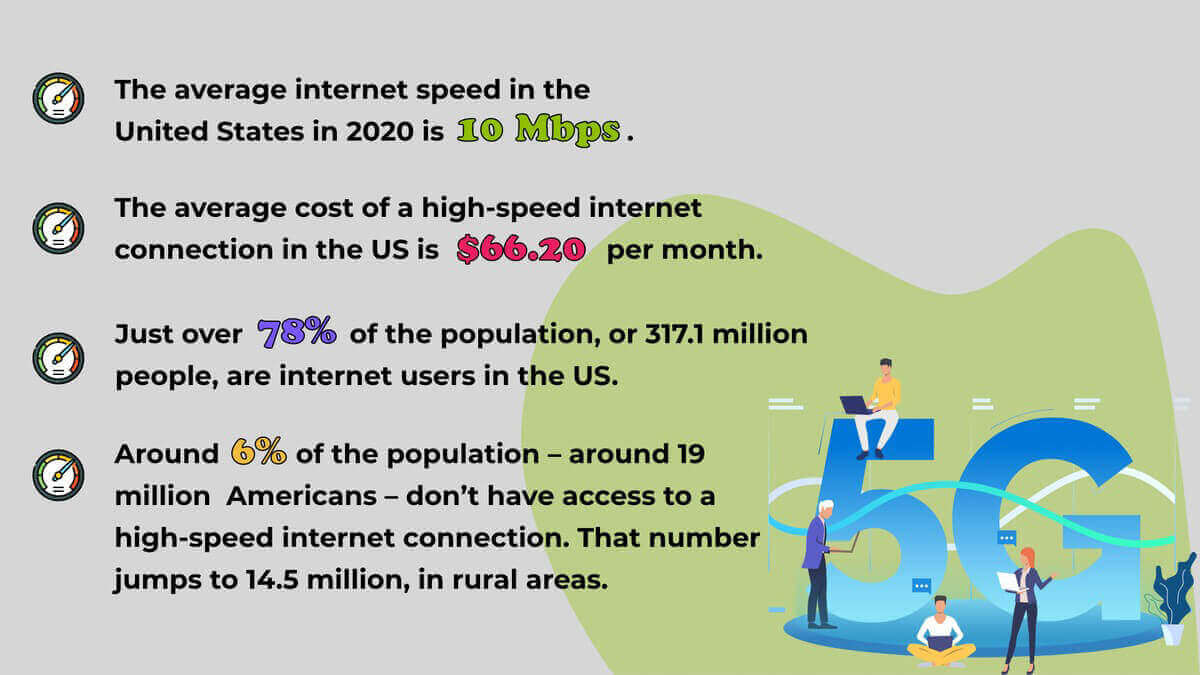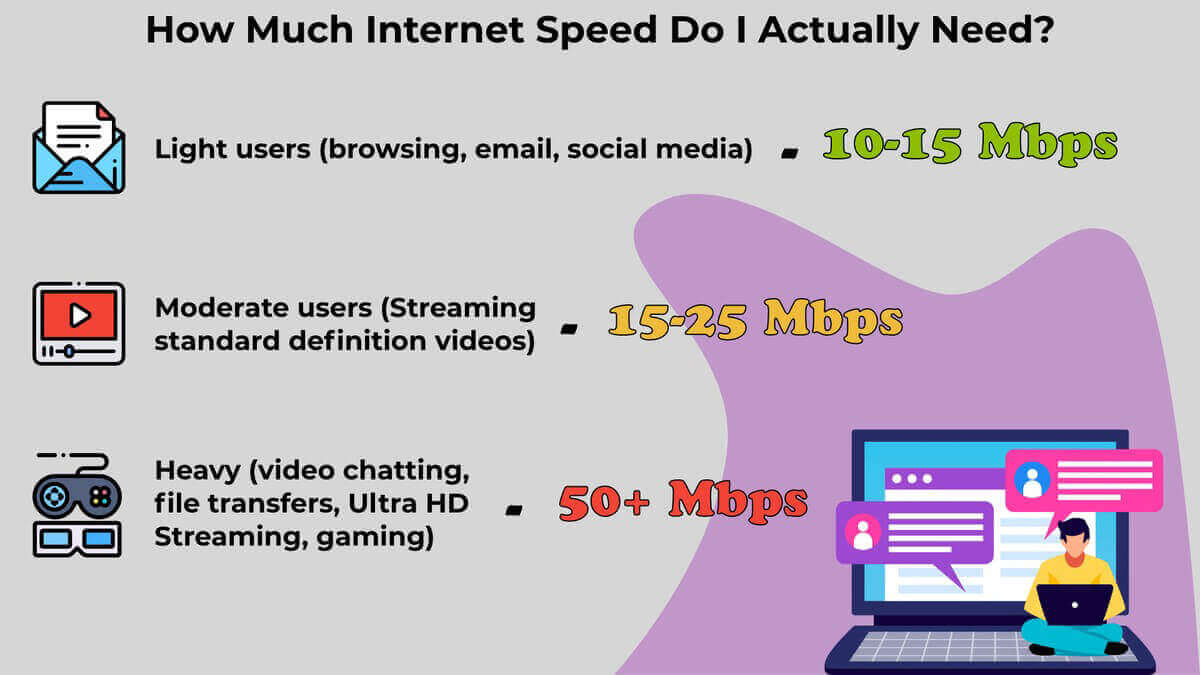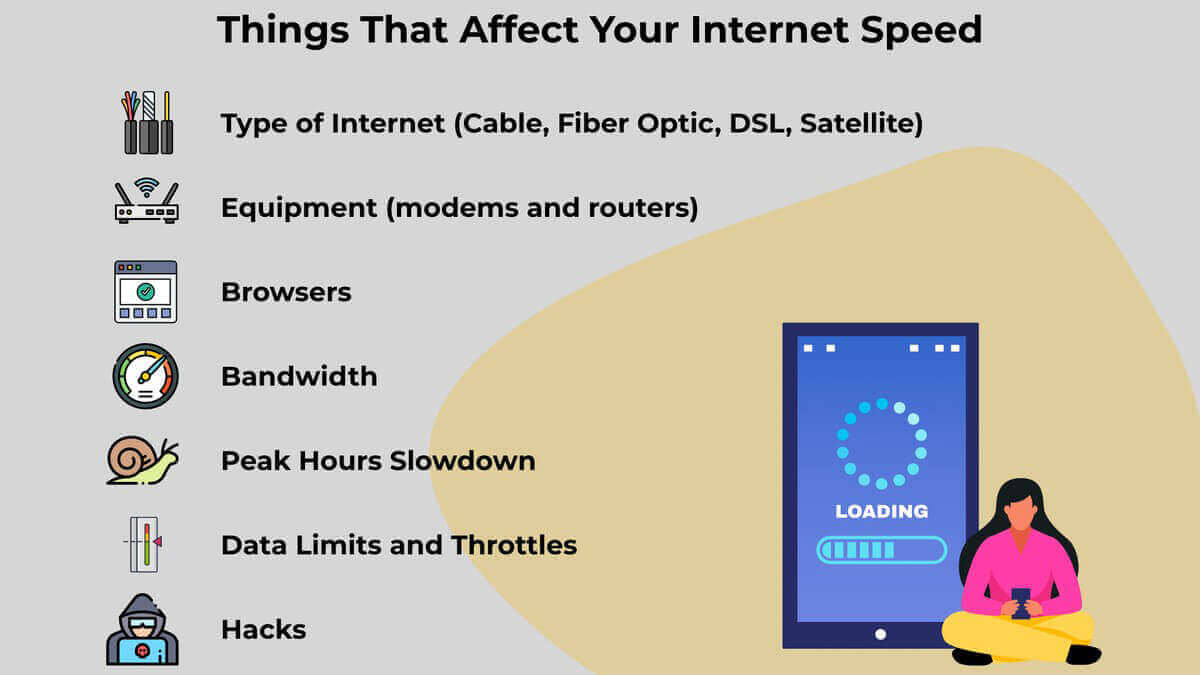Know How Much Internet Speed You Need
Table of Contents
You’ve probably seen the advertisements: “Get up to 1000 Mbps so that the whole family can stream, browse, and chat at high-speeds!"
They’re all over the place these days. And if you’ve ever had to suffer through a period of less than stellar internet speeds – when videos keep buffering, or calls keep dropping – you may be thinking it’s time to upgrade.
But before you pull out your credit card and sign up for one of these premier, lightning-fast internet connections, you should know how much internet speed you need.
There’s a good chance the connection you have is enough. It might be slowed down by other factors, some of which are out of your control, meaning forking over more money to your internet provider probably won’t do much good.
To help you answer this question, we’ve put together this comprehensive guide that makes it easy to figure out exactly how much internet speed you need. We also look at what you can do to maximize your connection and save money to ensure you’re getting the best possible internet experience.
Internet Connections Today
Before getting too far into the specifics of your internet speed, here is a snapshot of the industry today:

Understanding Internet Speed Measurements
To fully understand everything we’re going to discuss about internet speed, it’s important to clarify what certain things mean, starting with how internet speed is measured.
Internet speed refers to how much data moves through your network at a given time and is measured in Megabits (the standard unit of measure for data) per second. Most of us are used to seeing this presented as Mbps.
You don’t need a computer science degree to know that the more Mbps your internet connection can deliver, the faster it will be. But there are a few other things you should know that will help you better understand what you’re looking at when inspecting internet speeds.
Upload and Download Speed
The internet is a two-way street. Data moves both from servers to connected devices and back.
Whenever you’re accessing information stored on servers from your device, you’re downloading. The obvious example is when you “download" a file, such as a photo or video onto your computer. Still, you’re also technically downloading when you’re streaming a video or just doing general web browsing.
Uploading occurs when you go the opposite direction and send data from your connected device “up" to internet servers. For example, if you run a website, you upload every time you publish a new blog post or add in a photo or an image.
The vast majority of users spend most of their time on the internet downloading, and internet companies usually only advertise this version of internet speed for this very same reason. When looking at how much internet speed you need, we will be looking mainly at download speeds.
But if you use the internet in such a way that requires you to have more uploading capabilities, then you’ll want to keep an eye on this.
Bandwidth and Speed
Another important thing to keep in mind when thinking about internet speed and how it’s measured is bandwidth versus speed, two related but different concepts.
Bandwidth refers to your network’s total capability, and it will dictate how well your internet will work on individual devices.
To help you visualize this, think of your network’s bandwidth as if it were a major highway in a city. The total number of cars that can run on the city’s individual streets depends on how many can access the city via the major highway. If there is too much activity on the smaller streets, this will eventually cause a backup on the major highway, slowing everything down.
As a result, bandwidth is important when you have a lot of people sharing the same network. It’s also measured in Mbps, although a network’s overall bandwidth often looks to be much smaller than the speed experienced on individual devices. This is mainly due to the difference in how each is measured.
Internet providers don’t always give you specific numbers to let you know how much bandwidth you have, choosing instead just to tell you how many devices the network can support. Just know that they are referring to the bandwidth in this instance.
All of this means that you will need to carefully consider how many people are usually using your network at one time, as this will help inform your decision as to which internet provider and plan you should choose.
How Much Internet Speed You Need
Now that we’ve clarified most of the important stuff about internet speed, it’s time to answer the key question: how much do you actually need?
We’ve found there are two ways to answer this question: the simple and the complicated way.
The Simple Way: More or Less Than What You Have Now?
Perhaps the easiest way to answer this question is to look at what type of internet speed you’re getting right now and ask yourself, “is this enough?"
Those who are constantly waiting on videos to buffer and load, who lose video and voice calls to poor connections, and experience long load times when accessing media-rich web pages are probably not happy with their current connection. These would fall into the category of users who need more speed than what they have now.
To get a bit more specific, consider running an Internet Speed Test. We recommend doing it at a couple of different points of the day over a few different days and using this tool, which tracks the results.
This will give you an idea of your internet speed in actual Mbps, and if your experience is unsatisfactory, you know to look for an internet connection with better capabilities that will prevent these frustrating load times and dropped calls.
However, even if you’re not dissatisfied with your internet connection, we still recommend running a speed test every so often.
There’s a good chance you are paying for a lightning-fast connection that you don’t need, which means you’re spending more money than you should be for your internet.
The Complicated Way: Determine Your Exact Needs
Okay, it’s not that complicated, so there’s no need to get too anxious. All you need to do is spend some time thinking about your internet use and putting yourself into one of three categories of users: light, moderate, or heavy.
Once you know where you fall, you will know exactly how much internet speed you need, and then you can compare this to what you’re paying for.
Alternatively, if you’re just moving into an area and searching for a new internet connection, this will help you identify the plan that will most meet your needs while also staying within your budget.
Here’s a description of each of the three categories so that you can determine where you stand:

- Light users don’t do much more than the basics on the internet, such as sending and receiving emails, browsing, social media, reading the news, etc. If this is all you use your home internet connection for, you don’t need a connection of much more than 10-15 Mbps.
- Moderate users rely on their internet for a bit more. They do all the same things as light users, but they are also big into streaming videos on popular media sites such as YouTube and Netflix (the standard version). To perform this type of activity without too many headaches, you’ll want to make sure you have at least 15-25 Mbps.
- Heavy users go a step further. They usually have a subscription to Netflix’s middle-tier plan, which allows you to stream content in Ultra HD and 4k, as well as Amazon Prime, Hulu, and/or Disney+, which also make use of these heavier video formats. Heavy users are also gamers, file-sharers, and people who frequently use the internet for video conferencing, especially with more than one person at a time. For this type of use, you will want a connection of at least 25 Mbps, but the heavier the use, the more you will want. It’s probably best to shoot for 50+ Mbps.
And there you have it. You should now be able to determine exactly how much internet speed you need. From there, it should be much easier to decide if it’s time to switch internet providers, upgrade your plan, or get on the phone to yell at someone that your expensive internet is still running too slowly!
Things That Affect Your Internet Speed
After you’ve gone through all of these steps and if you’ve either determined that you’re not getting the internet speed you want, or you’ve determined that you are, but you still aren’t happy with your internet experience, don’t jump to spend more money on your service.
There is a range of other things that could be affecting your internet speed, and you should consider them first before making any dramatic changes.
Here are some of the most significant things that could be slowing down your internet:

Type of Internet
Although the internet you access will be the same no matter which type of connection you have, how quickly you can access it will depend heavily on your connection. If you don’t have the best possible connection type, it doesn’t matter how much you upgrade; it still won’t be fast enough.
Cable
As the name suggests, cable internet runs through your cable lines and is serviced by the cable provider. It is one of the most common forms of high-speed internet out there – after all, almost everyone has access to cable – and it’s also one of fastest and most reliable.
However, one downside to cable is that there are local bandwidths to deal with. This means that the people in your area who also subscribe to the same service will impact the connection speeds you will experience.
In theory, cable companies are prepared for this. Still, it’s possible that if you live in a densely-populated area, and if the people around you are all “heavy" users, your connection will be slower no matter what. An excellent way to do this is to figure out how your internet performs during peak hours, roughly 7 p.m. to 1 a.m. If you notice a considerable slowdown during this time frame, then there’s a chance that upgrading your internet package might not do much.
Fiber Optic
Fiber optic internet connections are the fastest out there. They work in much the same way as cable connections, but they can handle quite a bit more data than cable lines. Most base-level fiber optic plans will offer you at least 100 Mbps, but more often than not, they will give you even more. They do tend to be more expensive, and they are also less widely available.
If you have a fiber optic connection and still aren’t getting the speed you need, there’s likely a problem with your equipment, and the best thing you can do is reach out to your internet service provider. However, in most cases, the people who go for a fiber optic connection rarely experience significant internet speed issues.
DSL
DSL stands for “direct service line" and runs through phone lines. It was the first form of high-speed internet to hit the market some 20 years ago, and although the technology is a bit older, it’s still effective. The speed you experience will depend on how close you are to the provider’s service center.
So, this means that if you’re using a DSL connection and are not getting the speed you’ve been promised, there’s a good chance it’s because you live too far from the service center. Upgrading probably won’t get you much; it’s usually best you look at either a cable or fiber optic connection to get the speed you need.
Satellite
Satellite connections are good because they can reach almost anywhere. However, beyond that, they aren’t great. Connection speeds are slow, and service can be interrupted by bad weather. If you’re using a satellite connection and don’t need to be – as in, you don’t live in the middle of nowhere – you’re probably going to want to change to another internet type so that you can get a better, more reliable connection.
Equipment
Another thing that could be keeping your internet from running at top speed is the equipment you are using, such as your modem and your router. Both are usually rated to handle certain speeds, and if the internet connection you’ve signed up for is above this limit, you won’t be able to experience it when you connect a device.
This can happen if you have recently changed services, i.e., upgraded, but didn’t get new equipment. Internet companies should catch this, especially if you are using rented equipment, but sometimes things slip through, which can seriously affect your connection speeds.
You can look up what your equipment is rated for by searching for each piece’s user guide online, usually by typing in the model number, which you should be able to find somewhere on the device.
If the issue is with the modem or an internet-company owned router, then you should bring it to your service provider’s attention. There is a good chance they will replace it for you, as old equipment on their network has the capability of slowing everything down.
Beyond your router and modem, it’s also possible your internet connection is being slowed down because of the device you’re using to access the web. Older computers or phones with less memory (RAM) will not be able to handle all that’s on the web these days. As a result, you should consider testing your network on a newer device before assuming the problem is with your service.
Browsers
The browser with which you access the internet can also have a pretty significant impact on the speed of your connection, although the effect is likely quite a bit less than with other things, such as your equipment.
Google Chrome, Mozilla Firefox, and Microsoft Edge are widely considered the fastest, whereas Safari, which comes standard on all Apple products, is known for being slower.
It would be a good idea to try using the web with a different browser to see if this has any impact on your experience before making the call that your connection simply isn’t good enough.
Bandwidth
The more people using your internet at once, the slower the connection is likely to be. As a result, if you’re experiencing slow internet speeds, you may want to consider testing your connection at different times of the day, when there are fewer people online streaming videos and doing other activities that consume bandwidth.
If you find the connection is sufficient when you’re browsing by yourself, then the issue is likely bandwidth and not your actual connection. Unfortunately, most internet companies won’t simply boost your bandwidth; they will usually require you to upgrade your package. Rather than upgrade, you could consider switching to a different type of internet connection, which gives you more bandwidth.
Peak Hours
Another thing to consider is when you are experiencing internet slowdowns. If it’s in the evenings or at night, between the hours of 7 p.m. and 1 a.m., then there is a pretty good chance you are the victim of a peak hour slowdown. Internet companies claim they can’t avoid this, but many people think they do it on purpose.
This is much more common for those with a cable internet connection because, as mentioned earlier, your bandwidth is shared in part with the other people in your area using the same service. If you’re really suffering, you might want to consider switching to a different connection type, such as a fiber optic plan.
Data Limits and Throttles
One somewhat unlikely reason your internet might be slowing down is that you’ve reached your monthly data limit. This is a new thing internet companies have started implementing, and although most limits are enormous – around one TB of data per month is the norm – it could happen. Once you reach that limit, your connection will be throttled or slowed down.
You can usually monitor your data usage through your account with your internet provider. If you do find yourself regularly going over, you may need to negotiate for a higher limit.
Hacks
Although you don’t want to think it could happen to you, your network could get hacked. People usually do this when they want to do illegal stuff on the web, such as pirate movies or other media, and don’t want to get noticed by their internet provider.
This can chew through your data limit and clog up your bandwidth without you really ever noticing it. It’s unlikely this is exactly what’s causing your slowdown, but consider changing your internet password and see if things get better. If they do, then this means somebody hacked you, and you will probably want to contact your internet provider, or perhaps even the authorities, to make sure it doesn’t happen again.
Browse Like Lightning
Now that you know everything about internet speed, including how much you need and how to maximize it, lightning-fast internet is not too far away. If you’re not satisfied with what you have now, then we advocate for spending some time implementing these fixes and testing things out. They can save you lots of time and money, and hopefully help connect you to the fast internet you need to thrive in our modern, digital world.

